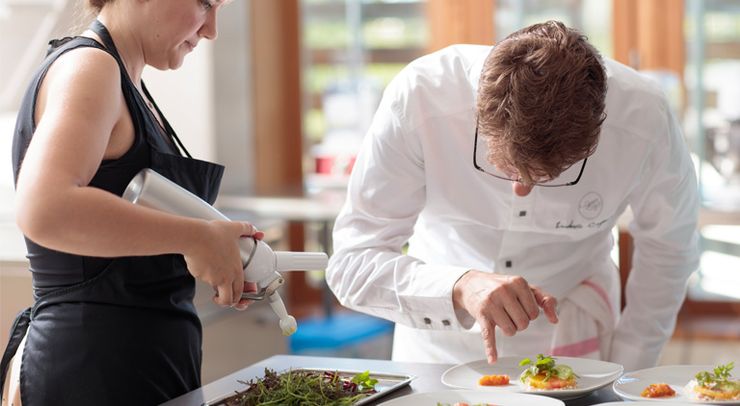Science served on a plate

UTC’s Summer School for “Culinary science” proposes that the participants from all round the world discover how the principles of chemistry apply to French gastronomy and to ‘revisit’ some of our great ‘classics’ implementing the latest developments and technologies in agro-food sciences. The forthcoming 3rd edition will take place July 17–28 at the UTC Daniel Thomas Innovation Centre.
During the two week intensive course, the attendees hear about new foodstuff techniques that stem from research work and learn how ‘cuisine’ can be more health-friendly and better adapted to specific diets programmes. Prof. Claire Rossi, a UTC research scientist in charge of the major specialty course on Innovation, foodstuffs. and agro-resources, launched this summer school two year ago. “Our objective is to provide participants with the necessary bases to scientifically understand how culinary preparations are made and to have them apply their new knowledge directly, ‘hands-on’.
On each day of the course, there are afternoon workshops that practice what is taught theoretically and learned in the morning lectures. Following a review of what the sense of taste entails and the role of various types of foodstuff ingredients from a chemical point of view, there are various experimentations. Proposed substitutions for sugar, fat and/or gluten are one of the highlights of the course.
The processes are applied to classical recipes from French traditional ‘cuisine’ and are adapted to comply with the most recent trends. Demonstrations and advice are given by a qualified ‘chef’, blending the rules of kitchen arts and technology. Examples are a sugar ‑free cholate cake or mayonnaise with twice less oil (in the earlier editions), this year’s targets include, notably a vegan ‘vacherin’ cake with no animal-sourced ingredients. Also as in the earlier editions, there will be week-end outings to allow the participants to take in and appreciate France’s culinary and cultural heritage. A wine-tasting outing will be organized to a champagne ‘cave’.
Participants from round the world
Ever since this Summer School existed, the formula has been found attractive to students from a variety of backgrounds. Motivations and level of skills vary too. “In 2015 and 2016, we welcomed lots of Asian participants who were attracted by the prestige of French culture and gastronomy and also participants with specialties far removed from food sciences”, explains course organiser Prof. Rossi.
The high repute of the French agro-food sector – first investor in R&D in France and a leader in world ranking is also an advantage. More and more applicants already have high-level skills and are seeking to complete their personal knowledge base. The quality of the pedagogy used and the concrete and user-friendly atmosphere of the workshops meet with unanimous approval. Mathan Goldstein, an Israeli PhD student in biology attended the 2016 session out of personal interest: “I found the summary explanations on the various forms of starch and the ways to replace them very clear, and since attending this Summer School, I cook my dishes differently”.
For Charlotte Verschaeren, studying nutrition and food sciences in Belgium, to complete her knowledge-base, there were also many discoveries in then course: “The varied formulae for the famous chocolate moelleux’ cake without any fatty ingredients using seaweed was a revolution inasmuch as the taste is identical. I think seaweed can expect a great future from an industrial standpoint but also for kitchen uses at home”. Year in year out, the programme, entitled “Culinary science for tastier and healthier food” has an ever-increasing audience. For the 2017 Edition, there will be thirteen participants from four different countries. Also this year and for the first time, there will be attendees for the adventure coming from the entrepreneurial world.




